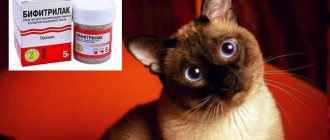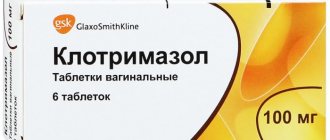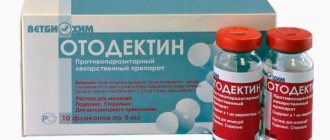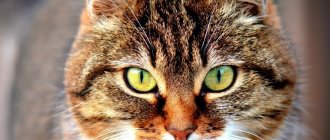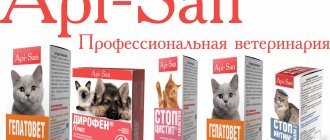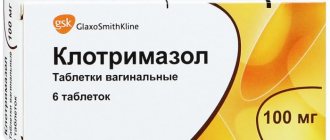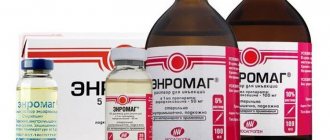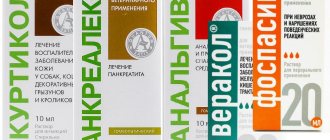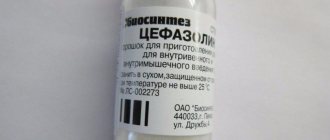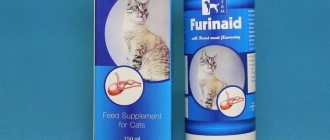Instructions for use
Dentavedin in gel form is very easy to use; every owner can handle this task. The gel is used both for the prevention of diseases of teeth and gums, and for the treatment of existing pathologies. Mode of application:
- Wear disposable rubber gloves.
- Place your cat between your legs on its back; in this position it is easiest to apply dentavedin.
- Squeeze 1 drop of gel from the tube onto your finger.
- With one hand, open the cat's mouth, and with the other hand, gently rub the gel into problem areas of the mouth.
It is important to remember that after using the gel, the fluffy dog should not be fed for half an hour.
Dosage
For a one-time full treatment of the gums, one drop of Dentavedin gel is enough. This amount of the drug is quickly absorbed into the soft tissues, providing a therapeutic effect. Exceeding the dose of the gel can cause such adverse reactions as discoloration of the enamel of the cat's teeth, excessive salivation and loss of appetite. It is less common for a cat to develop an allergy. In this case, stop using the gel and, after consultation with a specialist, give the animal an antihistamine. If a small dose of gel accidentally enters the gastrointestinal tract, it usually does not lead to adverse reactions.
Effect of the drug
Treating your pet with dentavedin is absolutely harmless, because the composition contains mainly natural ingredients. Their impact is as follows:
- Propolis perfectly heals small wounds and cracks on the gums.
- Chlorhexidine bigluconate eliminates inflammation and disinfects the entire oral cavity.
- The composition of the drug includes various tinctures and extracts from plant materials: sage, burdock, plantain, horsetail and others . Together they have a comprehensive healing effect, as the herbs eliminate fungal deposits, heal wounds, and strengthen gums.
pharmachologic effect
Dentavedin in the form of a gel contains natural components that have disinfecting, regenerating and anti-inflammatory effects. Chlorhexidine bigluconate is the active ingredient of the pharmacological product. The component relieves inflammation, disinfects microcracks and wounds on the gums and the inside of the cheeks. Dektavedin contains aqueous tincture of propolis (10%). The beekeeping product has an immunostimulating and regenerating effect. The gel contains a complex of extracts of medicinal plants: plantain, sage, horsetail, celandine and others. Medicinal herbs contain tannins, due to which they have an astringent, antifungal and wound-healing effect. Other medicinal properties of the drug: strengthening gums; provides prevention of tartar and caries; freshens breath; reduces the risk of loose teeth in older animals. For what diseases is a pharmacological agent prescribed: acute and chronic gingivitis; periodontitis; aphthous stomatitis; periodontitis; undergone manipulations to remove tartar. Dentavedin is a non-toxic drug due to its natural composition.
Compound
- chlorhexidine bigluconate;
- guar gum;
- propolis;
- distilled water;
- herbal extracts (nettle, eucalyptus, linden, sage, oregano, thyme, horsetail, yarrow, alder, marsh cudweed, echinacea, St. John's wort, birch and pine buds, dandelion roots, burnet, medicinal chamomile).
Dentavedin gel for gums 15 g.
COMPOSITION AND FORM OF RELEASE Dentavedin contains purified water, phytocomplex: chamomile flowers, large plantain leaves, alder fruits, string grass, St. John's wort herb, yarrow herb, thyme herb, dandelion roots, birch buds, Echinacea purpurea herb, sage leaves, wild rosemary shoots, marigold flowers, eucalyptus leaves, licorice roots and rhizomes, nettle leaves, pine buds, horsetail grass, celandine grass, violet grass, burdock roots, burnet roots and rhizomes, marsh grass, oregano grass, linden flowers; hydroxyethylcellulose, emulgin HRE 40, preservative. In appearance it is a homogeneous gel from gray to light yellow. The product is released packaged in 15 g dropper bottles, placed together with instructions for use in cardboard box packs. PHARMACOLOGICAL PROPERTIES Dentavedin has pronounced anti-inflammatory and wound-healing properties, and due to its gel-like structure, it is well absorbed and easily applied to the affected area. Chlorhexidine digluconate is a universal antiseptic with good bactericidal properties against gram-positive and gram-negative microorganisms, lipophilic viruses, as well as a fungistatic effect against pathogenic fungi. Propolis has local immunostimulating and strengthening properties, and has an antibacterial and antiviral effect. A complex of medicinal plant extracts has a tanning, hemostatic, bacteriostatic, wound-healing and analgesic effect, regulates and restores metabolic processes by improving microcirculation in dental tissues. In terms of the degree of impact on the body of warm-blooded animals, Dentavedin gel is a low-hazard substance and in recommended doses does not have a locally irritating, sensitizing, embryotoxic or teratogenic effect. INDICATIONS Prescribed for oral care of dogs, cats and other small pets. The product provides healing and cleansing of the oral mucosa, improves their appearance and condition, helps eliminate tartar, eliminates unpleasant odors, prevents the development of caries and loosening of teeth in dogs, cats and other small pets. DOSES AND METHOD OF APPLICATION To improve the health of the oral mucosa, prevent the development of caries, reduce the risk of developing periodontal inflammatory processes, and eliminate odor, the product is applied to the gum area 2 times a day for 7-10 days. If necessary, the procedures can be continued or repeated with a break of 2-3 days. To remove tartar, the product is applied to the teeth and gums 2 times a day for 5-7 days, then the plaque is removed with a soft stick, and periodontal pockets and the gum area around them are treated. After ultrasonic removal of tartar, it is recommended to treat the gums and teeth with the product for 14 days. It is not a medicinal product. SIDE EFFECTS Hypoallergenic. Individual intolerance to individual components of the product is possible. In very rare cases, when using the drug, staining of tooth enamel, tartar deposits and taste disturbances are possible; in hypersensitive animals, signs of allergy may be observed. If side effects occur, use of the gel should be discontinued. CONTRAINDICATIONS Increased individual sensitivity to the drug. SPECIAL INSTRUCTIONS No special precautions are provided.
It is recommended to consult a veterinarian before using medications.
0
Side effects
No adverse reactions were identified during the studies, only sometimes rashes occurred due to individual intolerance to chlorhexidine. You should not use more than 1 drop per application, as allergic reactions (itching, rashes) may occur.
Attention!
It is not recommended to use Dentavedin for the treatment of pregnant cats, as well as during lactation. This is due to the fact that this can negatively affect the health of future offspring.
Expert advice
The oral cavity of dogs and cats must be cared for using special toothpastes designed specifically for animals. Such toothpastes are usually used 1-2 times a week, but this is not always enough and then Dentavidin comes to the rescue.
Some tips on how to properly treat an animal’s oral cavity.
1. During treatment, never raise your voice or shout at your pet, otherwise this procedure will cause negative emotions and fear in him. Be as patient as possible! Don’t forget that animals can also have toothache and your actions cause unpleasant and painful sensations.
It is very important that your pet associates what is happening with a subsequent positive result.
2. Always use sterile medical gloves when processing. There may be wounds on the mucous membrane, especially if there is bleeding, so there is a possibility of infection.
It is best to apply a couple of drops of gel directly to your gloved finger and gently apply to your teeth and gums. If necessary, use additional cotton swabs
Pay attention to the condition of your teeth and the presence of stones. Remember that the procedure for removing stones from animals using ultrasound is carried out under anesthesia, so to avoid this process, use a complex of toothpaste, Dentavidin and bones and sausages specially developed for this purpose
What breeders say:
Sergey: A Siamese cat named Borya has been living in our family for 2.5 years now. We try to visit the veterinary clinic once a year for examination. And our cat has never been sick in his entire life, but a month ago he started having health problems. We noticed this because Borya began to approach the bowl less often and stopped playing with his toys altogether.
After some time, we made an appointment with the veterinarian, the specialist diagnosed stomatitis. The entire oral cavity of the fluffy was burgundy, and it was very unnatural. The doctor prescribed us a 2-week treatment with Dentavedin gel. Within 8-10 days the result was noticeable, as Borya began to bite and play with us again. Now I keep a couple of tubes of this wonderful gel in my medicine cabinet, and I recommend this product to everyone!
Ekaterina: Our British cat Sally became very ill last week. I couldn’t even think that cats could have problems with gums, but the veterinarian at the clinic showed me the opposite. My pet’s gums were swollen, and in some places there was even a little blood oozing out. For 3 weeks I applied Dentavedin gel to the cat’s gums. The first week there was practically no effect, but then I began to notice that the cracks in the gums began to gradually heal. The product is cheap, and at the same time it showed excellent results during treatment. I recommend dentavedin to all cat owners who are faced with gum or dental problems.
Video on how to brush a cat's teeth
Contraindications and precautions
Correct use of a pharmacological product reduces the risk of adverse reactions to the drug to zero. Dentavedin has a small list of contraindications for use, including: intolerance to the components of the gel; allergies to medicinal plants in its composition. Do not combine the drug with medications containing iodine. Pregnancy and lactation in a cat are another limitation on the use of Dentavedin. If the animal has problems with oral health during this period, the issue of using the medicine is discussed with a veterinarian. Despite the fact that the drug does not contain strong allergens and substances that have an irritating and warming effect, simple precautions are taken when working with it. The bottles in which the gel is packaged have a convenient dispenser that prevents the drug from spilling out of the container. If a person is allergic to the components of Dentavedin, especially to the medicinal herbs in its composition, then when working with the gel it is necessary to protect the skin of the hands with disposable rubber gloves. If an allergic reaction to Dentavedin gel occurs, a person should immediately consult a doctor, taking with him the instructions for the product.
Indications for use of Stomadin
A number of symptoms will tell the owner about diseases of the oral cavity in a cat. This includes bad breath from the animal, decreased appetite, and visually visible ulcers and inflammation on the gums. Such symptoms can occur in both young and old animals. They can be caused by mechanical reasons (rough food, hot food, chemicals and medications) or be the result of gastric diseases, allergies, infectious diseases, metabolic disorders, caries, vitamin deficiency. Often gum inflammation is caused by tartar.
Composition and release form
“Dentavedin” is a drug that is used in the process of oral care for small pets (cats, dogs) in the form of a gel. Its structure is homogeneous, it has a neutral odor.
Substances contained in the gel:
- chlorhexidine bigluconate - 0.05%;
- propolis - 0.3%;
- medicinal herbs in the form of extracts (chamomile, plantain, alder, string, St. John's wort, yarrow, thyme, dandelion roots, birch buds, echinacea, sage, wild rosemary, calendula, eucalyptus, licorice roots, nettle, pine buds, horsetail, celandine , burdock roots, burnet, marsh grass, oregano, linden flowers).
Did you know? Propolis is a natural antibiotic produced by bees. Thanks to it, the air in the bee hive remains sterile even during hibernation.
